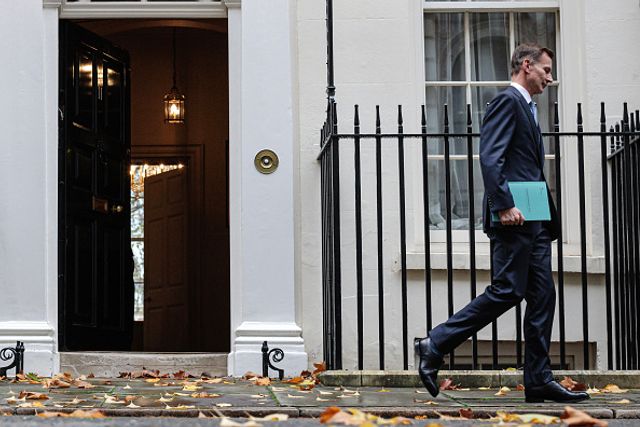The Autumn Statement: What it Means for Your Business
Paul Reilly
Chief Commercial Officer
September’s infamous mini-budget signalled the beginning of the end for the two people that concocted its controversial contents: then Chancellor of the Exchequer Kwasi Kwarteng and former Prime Minister Liz Truss - the shortest-serving PM in UK history. Entitled "The Growth Plan'', it was more a “fairytale” Rishi Sunak quipped during a Tory leadership debate in July.

Rob Stringer/Getty Images News via Getty Images
The far-from-happy ending for Truss and Kwarteng didn’t take long to unravel after the so-called mini-budget - with its unfunded spree of borrowing and further debt - sent markets into financial turmoil, causing the pound to plummet to its lowest level in decades.
Despite losing the Conservative leadership contest to Liz Truss only six weeks earlier, former chancellor Rishi Sunak was suddenly thrust into the hot seat - becoming the third Conservative prime minister in less than two months and the fifth in six years. Having inherited and retained Jeremy Hunt as chancellor - who started dismantling his previous boss’ economic plans before she even left office - the new PM announced that an autumn financial statement would be made on 17th November 2022.
This was an opportunity for the pair to do what corporate executives call “kitchen sinking”: attempt to get all the bad news out the way and take the toughest decisions at once, in a bid to rectify the mess of their predecessors and stay in power.
Barely eight weeks since the disastrous mini-budget, Jeremy Hunt has outlined plans designed to tackle inflation and restore the UK's credibility with international markets. So, what action has the chancellor been forced to take and how is it impacting the pound and small and medium enterprises (SME) in the UK? Here are some of the highlights from a business perspective:
R&D Tax Relief
The chancellor cut the rate of research and development (R&D) tax relief for small businesses in response to concerns about abuse of the SME R&D regime and to increase the international competitiveness of UK businesses. The government is rebalancing the rate of R&D relief - which can provide a vital source of financing for start-ups - as follows:
For expenditure on or after 1st April 2023:
- R&D Expenditure Credit (RDEC) rate will increase from 13% to 20%
- SMEs’ additional deduction will decrease from 130% to 86%
- SME credit rate will decrease from 14.5% to 10%.
The government will also consult on the design of a single R&D tax relief scheme and mechanisms to support R&D-intensive SMEs without increasing the £20bn allocated to supporting R&D.
Energy Industry Windfall Tax

The chancellor extended the windfall tax on oil and gas companies operating in the North Sea - a levy that was introduced in May but will now carry on for longer at a higher rate. He increased windfall taxes on these companies’ profits from 25% to 35% and extended them until 2028 as part of a fiscal consolidation plan to restimulate market confidence in the UK. The levy applies to profits generated from extracting UK oil and gas, not from other activities like refining oil and selling petrol and diesel on forecourts. Mr Hunt said the tax will raise £40bn over six years.
Hunt told MPs he had “no objection to windfall taxes if they are genuinely about windfall profits”, adding that “any such tax should be temporary, not deter investment and recognise the cyclical nature of energy businesses”.
Rishi Sunak introduced the tax just six months ago when he was chancellor after it emerged that energy firms are getting much more money for their oil and gas than in previous years. This is a result of increased demand after lockdown restrictions were lifted, plus the Ukraine war prompted concerns about energy supply.
Business Rates
Delivering his autumn budget to parliament, Hunt said plans to increase business rates by 10.1% from next year have been ditched and the total tax take will instead be frozen.
The chancellor also announced that this year’s 50% discount for retailers, leisure and hospitality will be extended for 12 months and increased to 75% to help them through the recession and a fall in consumer spending. According to the Treasury, this will benefit 230,000 properties and cost £2.1 billion. The package - which includes several other measures - will be worth £13.6 billion in total.
The Treasury said the measures mean the total increase in business rates bills will be under 1%, compared with over 20% without intervention.
Hunt said: “I will soften the blow on businesses with a nearly 14 billion pound tax cut over the next five years. Nearly two-thirds of properties will not pay a penny more next year and thousands of pubs, restaurants and small high street shops will benefit.”
The British Retail Consortium, UK Hospitality and the British Beer and Pub Association (BBPA) welcomed the package but said more still needed to be done.
Speaking after the announcements, UK Hospitality CEO Kate Nicholls said: “It remains the case that the current system is outdated and not fit for purpose. The government made a manifesto commitment of root and branch review and it’s essential that this (is) delivered as soon as possible.”
Import Tariffs

Import tariffs on over 100 goods will be frozen for two years from January, prompting savings of up to 18%. The measure follows pressure from businesses and stakeholders to reduce costs in certain sectors - from aluminium frames used by bicycle manufacturers to ingredients used by food producers.
The reduction in costs will be welcomed by the businesses that benefit. However, overseas suppliers, who are also feeling the effects of the global economic downturn, may look to increase the price of raw materials. Businesses importing products that are impacted should review trading terms with suppliers.
Impact on the Pound
The divisive mini-budget floored the pound in September, causing it to slump 5% against the dollar to 1.0327 - an all-time low. The UK currency recovered on 17th October after Mr Hunt continued to overturn the giveaway measures in his emergency statement - rebounding to 1.14 against the dollar and 1.16 against the euro. But its recovery was short-lived after the resignation of prime minister Liz Truss stoked political and economic uncertainty.
The pound touched a six-week high of 1.150 against the dollar on 25th October when Rishi Sunak became prime minister, as investors welcomed the former chancellor into number 10. Despite news that inflation had reached a fresh 41-year high in the runup to the all-important fiscal statement - which was pushed back from 31st October by the PM to give more time to finalise the details - and warnings that more interest rates hikes are needed to quell it, the currency hit three-month highs (1.19) against the dollar on 15th November. Its performance against the euro was less impressive, traversing the 1.14 range.
The pound was less sanguine on the big day, weakening after Jeremy Hunt announced a string of tax hikes and tighter public spending, saying the economy was already in recession and set to contract next year. The UK currency was 0.5% lower against the euro at 1.14 on 17th November, and tumbled sharply against the dollar, down 1% to 1.179.
Make International Payments with Clear Currency
The budget was delivered against a backdrop of rising interest rates, which the Bank of England has hiked to 3% to battle decades-high inflation. So it came as no surprise when the chancellor confirmed what many had feared and economists had predicted: the UK is already in recession - one the Office for Budget Responsibility (OBR) thinks will last “just over a year”. The OBR expects the domestic economy to shrink by 1.4% next year before growth gradually gathers pace again.
For some SMEs, the contents of the autumn statement has exacerbated this gloomy economic forecast - from cuts in tax relief to windfall taxes. While for others, support packages and tariff reductions could guarantee survival or even stimulate growth.
So, what can SMEs do to improve their long-term sustainability and ensure healthy profits in such a challenging and uncertain economic market? Economic policy might be beyond your control, but there is one thing your business can manage: the cost of making international payments amid a turbulent period for the pound.
Clear Currency specialises in providing businesses with clarity about the tools they can use to mitigate their exposure to currency risk. Exchanging money into another currency and transferring it overseas can be daunting and confusing. Aware of this, we use our knowledge and experience to cut through the jargon and provide you with a friendly and personal service.
When you join us, we will assign you a dedicated account manager. In addition to helping you benefit from quick, easy, and secure transfers, they can outline the tools available to mitigate the impact of currency risk on your international payments, including forward contracts.
Open your free Clear Currency account today for quick, secure and cost-effective international currency transfers.
Related Articles
Rising Energy Costs: What’s in Store for Start-ups and SMEs?
Start-ups and small and medium enterprises (SMEs) in the UK have lurched from one existential threat to the next so far this decade - and the latest challenge is really heating up.
Read more
The Tory Leadership Race: What it Means for Businesses
Ahead of the election of a new Tory leader in September, we take a look at some of the pledges put forward by Liz Truss and Rishi Sunak: and ask what's in store for businesses?
Read more
Fuel Risk Management: How Businesses Can Mitigate Rising Fuel Costs
The cost of petrol at UK pumps has reached a record high as Russia's assault on Ukraine continues to drive up global oil prices - and businesses of all sizes are feeling the pinch.
Read more



